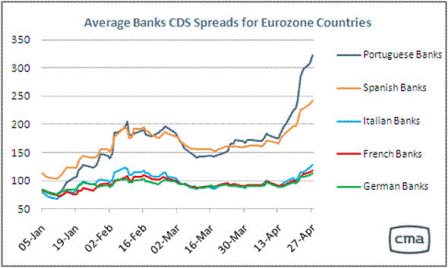Subtitle:
“Ticker Tape Parade for Trojan Horse”
Ordinarily China’s policy of driving exports to a nation with purchases of their currency is met with resistance. The US, for example,
has been chastising nations buying $US, like Japan and China, calling them currency manipulators, outlaws, etc. But China is getting very clever about it, here coming into the euro zone and buying Greek debt as the savior, and possibly even negotiating informal guarantees of repayment or other forms of support from the ECB, to keep the Greek debt off of the ECB’s balance sheet.
In any case, with Chinese buying, the euro zone is finding support for their funding issues, even as this ‘solution’ further drives up the euro and threatens to put a damper on their exports.
As previously discussed, the euro zone’s export driven model lacks the critical ingredient of being able to buy the currencies of the regions to which they wish to export.
All not to forget that imports are real benefits and exports real costs. So what we are seeing is a battle for export markets between nations who haven’t mastered the elementary art of supporting domestic demand and optimizing real terms of trade.
China to the Rescue! Wen Offers to Buy Greek Bonds
October 3 (Reuters) — China offered on Saturday to buy Greek government bonds in a show of support for the country whose debt burden triggered a crisis for the euro zone and required an international bailout.
Premier Wen Jiabao made the offer at the start of a two-day visit to the crisis-hit country where he says he expects to expand ties in all areas.
“With its foreign exchange reserve, China has already bought and is holding Greek bonds and will keep a positive stance in participating and buying bonds that Greece will issue,” Wen said, speaking through an interpreter.
“China will undertake a great effort to support euro zone countries and Greece to overcome the crisis.”
Greece needs foreign investment to help it fulfill the terms of a 110 billion euro (US$150 billion) bailout. This rescued it from bankruptcy in May but also imposed strict austerity measures, deepening its recession.
Greece, which has been raising only short-term loans in the debt market, has said it wants to return to markets some time next year to sell longer-term debt, although the EU/IMF package llows it to wait until 2012.
“I am convinced that with my visit to Greece our bilateral relations and cooperation in all spheres will be further developed,” Wen told Greek Prime Minister George Papandreou earlier in the day.
Greece and China pledged to stimulate investment in a memorandum of understanding and private companies signed a dozen deals in areas like shipping, construction and tourism.
“Our two countries, both historical and modern, have to strengthen our relations in all sectors, to move on and overcome present difficulties,” said Wen, speaking through an interpreter in televised comments.
The investment memorandum does not target specific investment volumes, an official close to Investment Minister Harris Pamboukis said ahead of Wen’s visit.
“We want to build this strategic partnership with China,” the investment ministry official said. “The purpose is not a signature on something big.”
China has said it needs to diversify its foreign currency holdings and has bought Spanish government bonds. In January, Greece denied media reports it planned to sell up to 25 billion euros of bonds to China.
Wen will address the Greek parliament on Sunday and leave early on Monday for Brussels, where he will attend an EU-China summit before going on to Germany, Italy and Turkey.
Clinching business deals with countries such as China and Qatar would help boost confidence among Greek consumers and businesses, economic analysts said.
With the global economic crisis and competition with other Balkan countries increasing, foreign direct investment in Greece fell from 6.9 billion euros in 2006 to 4.5 billion in 2009, according to Investment Ministry figures.
Chinese investment represents a very small proportion of this, excluding a 35-year concession deal China’s Cosco signed in 2008 to turn the port of Piraeus into a regional hub for a guaranteed amount of 3.4 billion euros, according to port authority figures.
Wen is also likely to deal with international pressure on China over its currency exchange policies during his tour.


